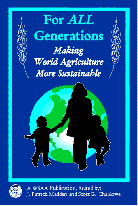| Home
|
| Sustainable Farming Connection |
| Where farmers find and share information. |
 Hot Link: Hot Link:
Can Organic Agriculture Feed the World? ... And Is That the Right Question? If you're content being a cog in the great wheel of industrial agriculture, you'll likely find this essay upsetting and challenging. The author, North Dakota organic farmer and sustainable farming activist Fred Kirschenmann, refutes the notion that all-out, high-input production for the global marketplace is the only way to feed the world. Kirschenmann even wonders if "feeding the world" should be our goal. "'Feeding the world' suggests that someone will take responsibility for feeding someone else, and therefore make them dependent. Under those terms, there can be no food security," he writes. "'Keeping the world fed' suggests that people will be empowered to feed themselves. That is essential to long-term food security." Critics of sustainable farming often argue that such methods can't keep up the pace of producing enough food to feed an ever-expanding human population. But Kirschenmann maintains that we need alternatives to the industrial model because it is quickly destroying the fragile ecological balances and using up the natural resources upon which farming depends. " … the real problem with the unprecedented increase in human population is that it has led to the disruption and deterioration of the natural functioning of earth's biotic community, and that is what threatens our future -- not lack of production," he points out. Reining in population growth, of course, is part of the solution. But the other major piece of the puzzle is to find ways of farming that mirror the evolutionary stability of the ecological neighborhoods in which we live, and that enhance rather than deplete our resources. After examining ag-related controversies ranging from global climate change to the role of livestock, Kirschenmann argues that organic farms " … integrated into local ecologies and rooted in local communities, can do a better job of keeping the world fed than large, corporate farms owned by distant investors." He concludes: "The best way to achieve food security is through food locally produced by local people with local control." Kirschenmann adds one caveat: "Since agriculture today is about power, powerful interests will oppose these new initiatives, and, of course, they will continue to claim that only their way can prevent world starvation."
|
| Top of Page |
| Home
|
©1997 Committee for Sustainable Farm Publishing
Please read about our usage permission policy and disclaimer.
Send comments, suggestions and questions to the site author:
Craig Cramer cdcramer@clarityconnect.com
Coded using HoTMetaL Pro 3.0. Best viewed in Netscape 3.0 or later.
Please see our credits page for more information.
http://sunsite.unc.edu/farming-connection/ruralwri/hotlinks/canorgan.htm

